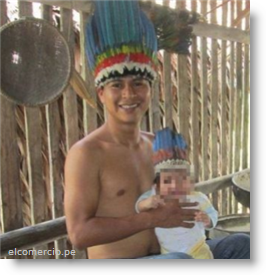 The member of a small indigenous tribe in Peru’s northern Amazon rainforest is battling for the right to register his baby boy’s name, which includes native letters, with the government’s national registry.
The member of a small indigenous tribe in Peru’s northern Amazon rainforest is battling for the right to register his baby boy’s name, which includes native letters, with the government’s national registry.
Ruben Medida, a member of the Murui indigenous community, said he hasn’t been able to get a Peruvian identity card, known as a DNI, for his son because his name includes a vowel that is unique to his native tongue.
The Murui dialect, part of the Huitoto language that is also spoken in southern Colombia, includes the standard five vowels, as well as the Murui vowel i.
The computers at the state agency responsible for issuing identification cards, which are necessary for individuals to receive services such as health and education, don’t include a key for the the Murui vowel i.
Medida said he has refused to change the name of his one-year-old son Andrés Finora, which means creator or maker in the Murui language. The national ombudsman organization, the Defensoria del Pueblo, says the case infringes on the right to identity.
“I have fought for years to create appreciation for my people’s language,” Medida said in comments reported by daily El Comercio.
Like many indigenous groups in the Amazon, the Murui have been the victim of intrusions by outsiders wanting to tap the region’s rich resources, including a rush to extract rubber during the late 19th century.
Medida said there are less than 200 members of his tribe in Peru’s Loreto region, living in two locations. “The majority of the Murui were decimated during the rubber boom,” he said. “My ancestors were the original inhabitants of the Putumayo area and they were put into semi-slavery just to exploit the white gold.”
As a baby, Medida’s mother tried to register him with an indigenous name, but was unable to because the government didn’t recognize the Murui language.
In April 2013, the government finally recognized the language after a battle for recognition from Murui activists, meaning that it should be used within all the state institutions.
The government agency responsible for issuing identifications, Reniec, denied any discrimination in the case. Reniec official Guillermo Nugent said that the agency is able to register names in languages such as Awajun of the north Amazon and the generally known Quechua, which are more widely used in Peru.
“The register simply can’t find on the computer the letter required to write the name,” said Reniec official Guillermo Nugent.
Nugent said that he gave an order to Reniec’s IT specialists to update the systems in order to include symbols from the Murui language.





